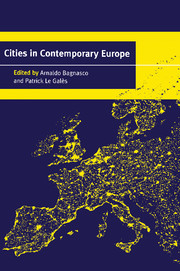Book contents
- Frontmatter
- Contents
- List of figures
- List of tables
- List of contributors
- Preface
- Introduction: European cities: local societies and collective actors?
- 1 European cities in the world economy
- 2 Spatial images of European urbanisation
- 3 Segregation, class and politics in large cities
- 4 Social structures in medium-sized cities compared
- 5 Different cities in different welfare states
- 6 Social movements in European cities: transitions from the 1970s to the 1990s
- 7 The construction of urban services models
- 8 Private-sector interests and urban governance
- References
- Index
3 - Segregation, class and politics in large cities
Published online by Cambridge University Press: 12 October 2009
- Frontmatter
- Contents
- List of figures
- List of tables
- List of contributors
- Preface
- Introduction: European cities: local societies and collective actors?
- 1 European cities in the world economy
- 2 Spatial images of European urbanisation
- 3 Segregation, class and politics in large cities
- 4 Social structures in medium-sized cities compared
- 5 Different cities in different welfare states
- 6 Social movements in European cities: transitions from the 1970s to the 1990s
- 7 The construction of urban services models
- 8 Private-sector interests and urban governance
- References
- Index
Summary
A long while ago, the city was where politics such as we still to a large extent know it today was invented. The mutual institution of city and citizen thus materialised there where population is at its densest. Further it came about through affirmation of the division between the citizens and the rest, between slaves and foreigners. Subsequently, the emergent nation-state widened the territory of citizenship and correspondingly reduced the political importance of cities, although the larger ones – those most often designated as capital cities – continued to provide the arena for intense political life where political power was concentrated, exercised and contested. Hence the rise in the economic and political importance of cities went hand in hand.
Today, the growing part played by supranational institutions, in Europe especially, and the development of economic globalisation in turn are reducing the role of states and the significance of national territory as a political arena. Scepticism over the coming emergence of European citizenship has the effect of producing a counter-interest in the renewed significance of infranational political areas, cities and regions appearing as rival candidates.
In this respect, large cities are in a paradoxical situation. On the one hand, if globalisation results in cities and even regions constituting territorial divisions which coincide less and less with economic flows and relations, the various readings that are put upon this economic transformation concur in recognising an advantage and a specific position for the larger cities, namely the thesis of the global city put forward by S. Sassen (1991) or that of the insuring function of the great metropolis advanced by P. Veltz (1996).
- Type
- Chapter
- Information
- Cities in Contemporary Europe , pp. 74 - 97Publisher: Cambridge University PressPrint publication year: 2000
- 19
- Cited by



